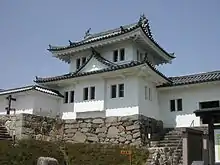Siege of Tanabe
The 1600 Siege of Tanabe was one of a number of battles which took place in parallel to the more influential series of battles known as the Sekigahara Campaign which led to the unification of Japan under Tokugawa Ieyasu.
| Siege of Tanabe | |||||||
|---|---|---|---|---|---|---|---|
| Part of the Sengoku period | |||||||
 | |||||||
| |||||||
| Belligerents | |||||||
| Forces loyal to Tokugawa Ieyasu | Forces loyal to Ishida Mitsunari | ||||||
| Commanders and leaders | |||||||
|
Hosokawa Fujitaka Numata Jakō | Onoki Shigekatsu | ||||||
| Strength | |||||||
| 500 | 15,000 | ||||||
The Command of Tanabe castle was held by Hosokawa Tadaoki. However, Tadaoki accompanies Ieyasu at Sekigahara in Tokugawa vanguard. Later, Tadaoki's father Hosokawa Fujitaka and his mother Numata Jakō defended the castle walls against Ishida Mitsunari's western forces under Onoki Shigekatsu. It is said that, due to the respect they held for Hosokawa, the besieging army was somewhat slower and less effective than they might have been otherwise, and in the end the battle served to tie up these Western Army (anti-Tokugawa) contingents, preventing them from being present at Sekigahara.
References
- Turnbull, Stephen (1998). 'The Samurai Sourcebook'. London: Cassell & Co. p252.
- Bryant, Anthony J (1995). 'Sekigahara 1600 - The final struggle for power', London: Osprey Publishing.
